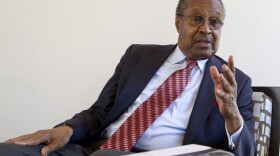Michele Norris
-
Through powerful monologues, Anna Deavere Smith has tackled race riots, integration and health care. In Notes from the Field, she's using her characters to explore the school-to-prison pipeline.
-
Pulitzer Prize-winning playwright Suzan-Lori Parks is finishing a run on her latest work, "Father Comes Home From the Wars (Parts 1,2 & 3)" at The Public Theater in New York.
-
NPR's Michele Norris continues her conversation with Marc Quarles for The Race Card Project. Quarles six words are: With Kids, I'm Dad; Alone: Thug.
-
A huge hit upon its release, the 1949 musical South Pacific still resonates with contributors to The Race Card Project — particularly a song about how prejudice is learned, not innate.
-
After days of worry, Clarence B. Jones, legal adviser to Martin Luther King Jr., was relieved to stand at the Lincoln Memorial and watch the event unfold without a hitch. While there's been great progress in the decades since, Jones says, he also feels King's dream still remains unfulfilled.
-
Clarence Jones played an integral but mostly unseen role in the 1963 March on Washington. As Martin Luther King Jr.'s legal adviser, Jones assisted in drafting King's landmark speech, and drew from a recent event in Birmingham, Ala., to craft one of the speech's signature lines.
-
Joseph Burden and Martin Niverth, officers with the segregated D.C. police department, were both assigned to patrol the March on Washington. Burden, who is black, worked while wishing he could participate. And Niverth, a white man, was surprised to be assigned a black partner for the day.
-
When she was just 12, Edith Lee-Payne's face was immortalized in an iconic photo from the March on Washington. Decades would pass before Payne learned that her image has been used as part of documentaries, books, calendars and exhibits about the history of the civil rights movement.
-
In August 1963, Robert Avery of Gadsden, Ala., was 15 and active in the civil rights movement. He and two friends were bent on participating in the March on Washington, but with little money, they had no choice but to hitchhike — on Southern roads that could be dangerous for segregation opponents.
-
When civil rights worker Jack Hansan traveled to Washington to participate in the march, the fear of violence breaking out was very real. But the father of four knew he had to be there, not just to witness history, but also to play a part in changing it.





